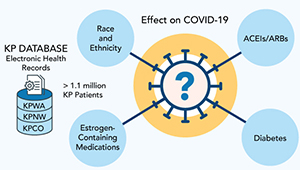Susan Shortreed, PhD
Biography
Susan Shortreed, PhD, uses statistics and machine learning methods to address health science problems, with a special emphasis on analyzing complex longitudinal data. She develops and evaluates statistical approaches for observational data, and works to improve the design and analyses of studies that use data collected from electronic health care records. She is leading a project to develop statistical methods for constructing personalized treatment strategies using data captured from electronic health records.
Dr. Shortreed earned her PhD in statistics from the University of Washington. Then she spent two years in the Department of Epidemiology and Preventive Medicine at Monash University in Melbourne, Australia, and two years in the School of Computer Science at McGill University in Montreal, Canada. Dr. Shortreed has collaborated with scientists in a broad range of areas including alcohol use, cancer screening, and medication safety. She now works alongside researchers in mental and behavioral health, evaluating and comparing treatments for chronic pain and depression, and interventions to prevent suicide. Dr. Shortreed is an investigator with the Mental Health Research Network, designing studies to address important public health concerns, such as determining which antidepressant medications work best for which patients and developing risk prediction algorithms to identify individuals who may be at increased risk for suicidal behavior.
Dr. Shortreed is also an affiliate professor of biostatistics at the University of Washington School of Public Health. She served on the executive board for the American Statistical Association’s Section on Statistics in Epidemiology and the editorial board of the Journal of the Royal Statistical Society, Series C: Applied Statistics.
Research interests and experience
-
Biostatistics
Design and analysis of studies that use data collected from electronic health records; analysis of complex longitudinal data; methods for constructing personalized treatment strategies, computational statistics and algorithms; machine learning; variable selection methods.
Medication Use & Patient Safety
Biostatistics; machine learning; using data collected from electronic health records to study rare adverse events; opioid safety; medication safety in pregnancy.
-
Mental Health
Biostatistics; treatment for chronic depression; suicide prevention; developing personalized treatment strategies; developing risk prediction models.
Recent publications
Penfold RB, Johnson E, Shortreed SM, Ziebell RA, Lynch FL, Clarke GN, Coleman KJ, Waitzfelder BE, Beck AL, Rossom RC, Ahmedani BK, Simon GE Predicting suicide attempts and suicide deaths among adolescents following outpatient visits 2021 Nov;294:39-47. doi: 10.1016/j.jad.2021.06.057. Epub 2021-07-01. PubMed
Penfold RB, Whiteside U, Johnson EE, Stewart CC, Oliver MM, Shortreed SM, Beck A, Coleman KJ, Rossom RC, Lawrence JM, Simon GE Utility of item 9 of the patient health questionnaire in the prospective identification of adolescents at risk of suicide attempt 2021 Oct;51(5):854-863. doi: 10.1111/sltb.12751. Epub 2021-07-31. PubMed
Coley RY, Walker RL, Cruz M, Simon GE, Shortreed SM Clinical risk prediction models and informative cluster size: Assessing the performance of a suicide risk prediction algorithm 2021 Oct;63(7):1375-1388. doi: 10.1002/bimj.202000199. Epub 2021-05-24. PubMed
Simon GE, Shortreed SM, DeBar LL Zelen design clinical trials: why, when, and how 2021 Aug 17;22(1):541. doi: 10.1186/s13063-021-05517-w. Epub 2021-08-17. PubMed
Walker RL, Shortreed SM, Ziebell RA, Johnson E, Boggs JM, Lynch FL, Daida YG, Ahmedani BK, Rossom R, Coleman KJ, Simon GE Evaluation of Electronic Health Record-Based Suicide Risk Prediction Models on Contemporary Data 2021 Aug;12(4):778-787. doi: 10.1055/s-0041-1733908. Epub 2021-08-18. PubMed
Coulombe J, Moodie EEM, Shortreed SM, Renoux C Response to: Baby Steps to a Learning Mental Health Care System: Can we do the Work? 2021 Jul;190(7):1223-1224. doi: 10.1093/aje/kwaa262. PubMed
Coulombe J, Moodie EEM, Shortreed SM, Renoux C Can the Risk of Severe Depression-Related Outcomes be Reduced by Tailoring the Antidepressant Therapy to Patient Characteristics? 2021 Jul;190(7):1210-1219. doi: 10.1093/aje/kwaa260. PubMed
Coley RY, Johnson E, Simon GE, Cruz M, Shortreed SM Racial/Ethnic Disparities in the Performance of Prediction Models for Death by Suicide After Mental Health Visits 2021 Jul;78(7):726-734. doi: 10.1001/jamapsychiatry.2021.0493. PubMed
Simon GE, Matarazzo BB, Walsh CG, Smoller JW, Boudreaux ED, Yarborough BJH, Shortreed SM, Coley RY, Ahmedani BK, Doshi RP, Harris LI, Schoenbaum M Reconciling Statistical and Clinicians' Predictions of Suicide Risk 2021 May;72(5):555-562. doi: 10.1176/appi.ps.202000214. Epub 2021-03-11. PubMed
Dublin S, Walker RL, Floyd JS, Shortreed SM, Fuller S, Albertson-Junkans L, Harrington LB, Greenwood-Hickman MA, Green BB, Psaty BM Renin-angiotensin-aldosterone system inhibitors and COVID-19 infection or hospitalization: a cohort study 2021 Apr 20;34(4):339-347. doi: 10.1093/ajh/hpaa168. PubMed
Research

COVID risks not meaningfully greater with estrogen-containing medications
Oral contraceptives, hormone therapy not linked to more severe COVID outcomes.
Research

A medication that can relieve symptoms of psychosis is underused
Study finds that many patients who might benefit from clozapine don’t receive it.
Research

New findings on treating hypertension in pregnancy
A study led by Dr. Sascha Dublin finds similar outcomes for 3 hypertension medications, filling an evidence gap.
COVID-19

Greater infection risks linked to COVID-19 disparities
New work by Susan Shortreed, PhD, finds infection risks drive worse outcomes for some racial and ethnic groups.
Drugs, diabetes, disparities

Studying COVID-19 risk and outcomes
Dr. Sascha Dublin tells how studies of KP electronic health record data can improve COVID-19 treatment and prevention.
KPWHRI IN THE MEDIA
Simpler models for predicting suicide risk work comparably to more complex ones
Q&A: Simple machine learning model predicts suicide risk well
Healio Psychiatry, April 12, 2023



